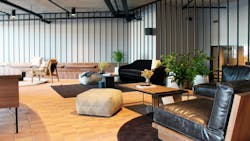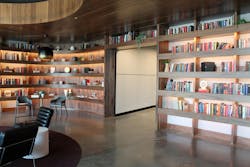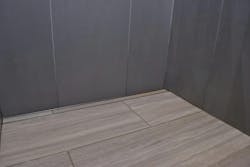Creating Wellness-Centric Hospitality Spaces: 5 Trends for Enhancing Guest Experiences
In today’s hospitality industry, the focus on guest wellbeing has taken center stage, with hotels and resorts prioritizing health and wellness to meet evolving guest expectations. This shift aligns with a broader trend of creating spaces that foster relaxation, mental rejuvenation, and physical wellbeing. Hospitality properties are now incorporating design and operational strategies that go beyond luxury, transforming the guest experience through wellness-focused environments.
With the rise of wellness tourism and health-conscious travelers, hospitality spaces must adapt by integrating features that promote well-being throughout the guest’s stay.
We recently attended The Lodging Conference in Phoenix, Arizona, a premier event for the hotel industry’s leaders to discuss development, finance, and operations. Notably, exhibitors showcased various innovations aimed at enhancing guest wellness, ranging from technological advancements to thoughtful space utilization. This article will both share insights from the conference and delve into the broader trends of health and wellness upgrades in the hospitality sector. From communal areas to private guest rooms, here are the key trends shaping the future of wellness-focused hospitality spaces:
1. Transforming Common Areas into Wellness Havens
Common areas have always been essential in providing spaces for socialization and relaxation, but wellness elements are now being incorporated to enhance these experiences. Whether through meditation zones, fitness corners, or calming environments like reading nooks, hotels are redefining communal areas to serve as wellness oases.
For example, wellness lounges or fitness spaces equipped with yoga mats, stretching stations, or even guided meditation sessions can offer guests physical and mental rejuvenation. Hotels can take it a step further by introducing interest-based clubs, like running or book clubs, creating opportunities for social interaction and emotional well-being.
2. Elevating Guest Bathrooms into Wellness Retreats
Bathrooms in hospitality spaces have become wellness centers of their own. Upgraded bathroom amenities, such as linear drains with curbless showers, as well as water filtration systems, are designed to enhance accessibility, reduce visual clutter, and promote relaxation.
Linear drains marry sleek design with functionality, contributing to the minimalist, spa-like atmosphere. Linear drains are a key component of luxurious “wet-room” spa baths and are commonly used in curbless showers. They are popular for seamlessly combining style and functionality. Curbless showers contribute to cleaner lines in the bathroom, reduce visual clutter, and enhance accessibility, all of which promote well-being.
When it comes to hospitality applications, selecting the right shower drain is crucial, especially when converting bathtubs to showers in hotel spaces. It’s important to consider adjustability at the point of installation, which is often overlooked but can significantly impact the efficiency of pre-formed shower bases or pans. Plumbing and fixture layouts vary from bathroom to bathroom, making it difficult to find custom-sized, pre-formed shower bases or pans that fit perfectly. Therefore, a drain system that offers onsite adjustability through customizable components is much more convenient. This is particularly relevant as bathrooms become more spacious and showers become larger, with hotels increasingly opting to replace tubs with walk-in showers. These changes align with growing design trends, such as luxurious design, increased accessibility, and easier maintenance.
Additionally, features like steam showers, voice-activated smart systems, and extra-deep soaking tubs allow guests to personalize their wellness routines, making their stay more refreshing and stress-relieving.
3. Lighting for Wellness and Ambiance
Lighting in hospitality spaces significantly impacts guest mood and wellbeing. Many properties are embracing natural light, large windows, and biophilic design to boost mood and energy. Adjustable lighting options also give guests control over their environment, providing flexibility between bright, energizing light for the day and warm, calming light for the evening.
Lighting technology has evolved to integrate circadian rhythms, allowing guests to adjust the color temperature from cool daylight to cozy evening light. Such enhancements create a comforting and restful atmosphere, improving sleep quality and overall guest satisfaction.
4. Embracing Touch-Free Technology for Health and Safety
Touch-free technology has gained significant traction as a health and wellness necessity. Automated doors, touch-free check-ins, and touchless faucets not only improve hygiene but also create a sense of modern luxury. These technologies minimize the spread of germs, enhancing the wellness of high-traffic hospitality spaces.
Touch-free faucets in guest bathrooms and common areas reduce the risk of cross-contamination and are increasingly viewed as essential in luxury hospitality environments. Beyond hygiene, they contribute to a seamless, high-end guest experience.
5. Guest Room Enhancements for Personalized Wellness
Guest rooms are no longer just spaces to sleep but are evolving into sanctuaries of wellness. From ergonomic furniture and hypoallergenic bedding to air purification systems and noise-reducing features, the design of guest rooms now supports both relaxation and productivity.
Wellness-focused properties are introducing features like aromatherapy diffusers, calming color palettes, and even on-demand fitness and meditation resources. By creating a customizable environment, hotels are empowering guests to prioritize their wellbeing, whether through relaxation or active self-care.
The Future of Wellness in Hospitality Spaces
As guest preferences continue to shift towards holistic wellbeing, hospitality properties that focus on integrating wellness throughout their spaces will have a competitive edge. From common areas that encourage social wellness to private rooms designed for personalized relaxation, hotels and resorts that embrace these trends will not only enhance guest satisfaction but also set a new standard for wellness in hospitality design.
About the Author
Randy Peyton
Randy Peyton, Hospitality Sales Manager for Oatey Company and QuickDrain, has been in the hospitality industry for more than 15 years, based in the Washington, DC, metro area. He works with hotel owners, operators, general contractors, and installers, covering the United States.


